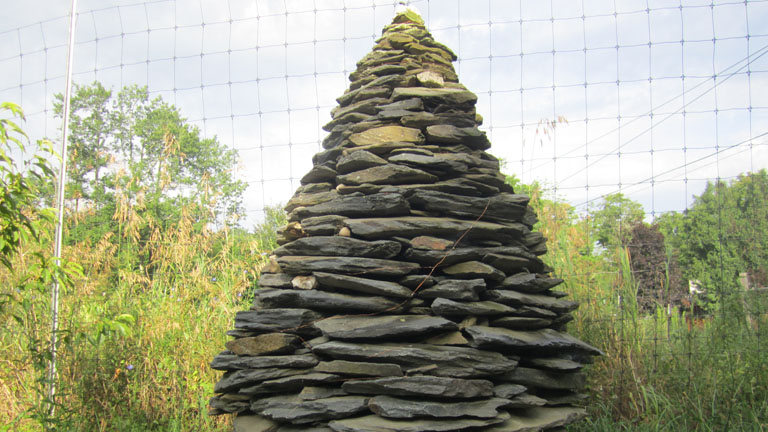This is an online-only article associated with the Fall 2019 edition of Communities, “The Shadow Side of Cooperation”—full issue available for download (by voluntary donation) here.

Not My Car
A prospective member of our new community reacted negatively to a proposal to restrict individual car ownership. As a survivor of both childhood sexual abuse and domestic physical abuse, the prospective member had often escaped from dangerous situations by driving away; when they’d lost everything else, they still had their car. Sometimes they’d lived in it. In a world of predators and well-meaning failed protectors, only the car was theirs alone, and it always facilitated freedom and relative security.
Some members didn’t understand. Surely, they answered, the community would offer that safety and security. Surely the community’s education in radical consent and anti-oppression work would prevent abuse from happening. Surely the candidate would never want to run away from people who respected and cared about them. Why deploy the individualistic and consumptive automobile as protection from the predatory system that spawned it?
Intentional community offers the potential for living in contexts high in trust, intimate communication, and resource-sharing. All of these should ideally provide security to victims of trauma and abuse. But it’s not that simple: From reluctance of survivors to surrender their personal vehicles (often their clearest and most immediate means of freedom and security) to hindrances in deliberation and consensus due to layers of interpersonal mistrust, survivors may feel discouraged from joining community or not completely safe once they’re here.
In this short article I’m going to draw on perspectives from my own life and career to explain the problems faced by survivors of traumatic abuse (including me) in trying to form and participate in community. Although I am committed to helping build my own community here in Wyoming, I don’t have a good, comprehensive answer to the paradox of community and abuse survival, and I’m not going to try to give you something I don’t really have. What I will do is sketch out the beginnings of a paradigm that dwells with the uncertainty and incompleteness of the survivor’s relationship with community.
In laying out this challenging perspective, I’m informed by my work experience with both victims and offenders, as well as my understanding of theories of power and how power functions in communities.
Hazards of Zealotry and Devotion
Imagine a tightly-knit community where revelations of abuse emerged between a well-loved couple. Members uneducated about the nature of domestic abuse might suggest the couple seek counseling, even though most victims’ advocates caution (www.thehotline.org/2014/08/01/why-we-dont-recommend-couples-counseling-for-abusive-relationships) strongly (www.co.washington.or.us/CommunityCorrections/VictimServices/Services/upload/12-Reasons-Why-Couples-DV.pdf) against (www.breakthesilencedv.org/isnt-problem-can-fix-domestic-violence-couples-counseling) this.
That bad idea might receive more force because of the ideological commitments of the community―the confidence community members have that their particular beliefs and processes are revolutionary, or better informed than the recommendations of victims’ advocates.
The various worldviews that favor community are often very optimistic: if not about the state of the world, then about the potential of the community, its systems and practices, to produce happiness and security. The tendency to groupthink (see en.wikipedia.org/wiki/Groupthink), or the phenomena of charismatic members, exacerbates this flawed optimism.
Or, community members may celebrate the resilience of trauma survivors, but unintentionally turn that celebration into an expectation that survivors be strong when we want them to be. But survivors can’t be resilient all the time (and seldom even most of the time), and that kind of expectation, often projected in nuanced and just-below-conscious ways, is a kind of abusive tokenism.
Your ideology, no matter what it is, won’t cure my trauma, and if you pretend it will, I will become angry, and I might experience the trauma all over again. The friendliness part of your friendly enthusiasm about community won’t make me trust you. I have experienced things you have not, and one of those things is the phenomenon of power getting underneath well-meaning practices and words.

Power Burrows underneath Everything
My abuser was really good at talking me through the things he wanted me to do. He was skilled at framing explanations that held me solely responsible for things he did, and I would feel unreasonable and ungrateful if I told him “no.” I was left believing I desired abuse.
Although I am spiritually and ideologically drawn to community and cooperation, and even though I have taught speech communication and debate, I don’t really trust communication processes or communities. They are all too easy to manipulate.
Yes, I believe in and want community. No, I do not trust community.
Research into such trauma reveals several paradoxical belief-states. “[I]t is possible,” Karyn Freedman writes, “for an individual to believe that she is safe in place p at time t and yet experience hyperarousal and even feel afraid. Likewise, it is possible for an individual to believe that she is unsafe in place p at time t and yet not experience the relevant emotional or physiological state.” Central to the unresolvable tension between the survivor and the intentional community is that the survivor sees abuse (which is about power) as ever-present and diffusive, while community, often unconsciously, holds itself out as able to limit or eliminate abuse in everyday practices and structures. Community (correctly, in my opinion) seeks to hardwire non-oppressive, cooperative, and deliberative systems. But the tendency to abuse not only evades such systems, but responds to them by subverting them or “dissipating” (www.powercube.net/other-forms-of-power/foucault-power-is-everywhere) the power and control of abuse so that it may re-emerge elsewhere.
Facilitators, processes, good-faith efforts to dig out the roots of hierarchy and domination; none of these things completely eliminates the threat of abuse, and survivors will be more attuned to that threat and its tendency to burrow underneath every completed dig. A mentor or designated companion can subtly dominate and manipulate a new member who survived abuse. Members might believe they have eliminated the source of some kind of trigger by “deliberating it away,” but the ghost or residue of the trigger remains for the survivor. Someone can lie in their disclosures. They might not even know they’re lying; or they might have convinced themselves, through layers of self-justification, that their lies are justified.
Communities in denial about the omnipresent and diffusive nature of abusive power may find not only that they’ve failed to truly hear a victim, but that they’ve perpetuated the reputation of “communes” as havens for abuse, reinforced by documented cases of such abuse from the past and the present. Of course, abuse is present everywhere, but intentional communities will be judged by their worst examples.
Trauma-Informed Community
Yes, I believe in and want community. No, I do not completely trust community and might never. If you want me here, you have to ride that contradiction with me.
Incorporation of victim-centered epistemology and respect for deep personal autonomy can seem at odds with communities’ goals of sustainability and cooperative culture mainly because, like domestic violence shelters, intentional communities are alternative societies embedded in, while often struggling valiantly against, deeply oppressive systems of power inequality. But recognizing and politicizing that tension can help victims and communities.
Trauma-informed epistemology (www.uoguelph.ca/arts/sites/uoguelph.ca.arts/files/public/FreedmanPsychicTrauma.pdf) recognizes the pervasiveness and commonality of deep physical and emotional trauma, and acknowledges that “fixing” that trauma is beyond the capacity of most people and projects in everyday life. Trauma-informed epistemology lives with the same uncertainty as the victim of trauma, an uncertainty brought about by encountering “loathsome facts about the world and the possibilities of human behavior,” where one’s “worldview is shattered.” It begins there and builds from there.
What emerges is both a recognition of victims’ pragmatic acknowledgement that they have to live and act in the world, and an ever-present compassion for the difficulty of such action. While the survivor can help others understand abuse and oppression, and thus help lay the grounds to transcend it, community members must never expect such resources from the survivor as a matter of course. Equally important, community members must never question a survivor’s preference to have a way out―a back door, an escape route or safe zone, not subject to arbitration or approval by the community in any way.
Communities utilizing trauma-informed epistemology also have the potential to become spaces to re-politicize the fight against intimate abuse. As activists have described (digitalcommons.law.yale.edu/cgi/viewcontent.cgi?referer=https://www.google.com/&httpsredir=1&article=4558&context=ylj), back when they were called “battered women’s shelters,” domestic violence shelters were part of a struggle against violence recognizing that “the personal is political.” But the influx of nonprofit and state money into shelters, and the accompanying academic cataloging of the phenomenon, have turned many shelters into “places that provide[] services to clients, rather than places of activism,” with residents becoming “psychologically damaged victims, not political recruits.” Insofar as intentional communities serve as spaces to cultivate anti-oppression work, they can be spaces that facilitate the fight against abuse as part of the larger building of new economic and political systems.
As Mary R. Harvey writes (www.challiance.org/resource.ashx?sn=vovtowards20an20ecological20understanding20of20res), “resilience is transactional in nature, evident in qualities that are nurtured, shaped, and activated by a host of person-environment interactions.” Communities must negotiate their spaces with trauma survivors rather than expecting those places to be ready-made or easily adapted into. There are directions, but there are no “solutions” in the sense of finality. Trauma-informed community accepts such ambiguity and commits to keeping the survivor safe in wide zones of ambiguity, as challenging as that might be.
Matt Stannard has worked with victims of violence as a legal and resource advocate, and in postconviction legal support for violent sexual offenders. He is a member of Solidarity Collective in Laramie, Wyoming, and produces the Solidarity House Cooperative podcast series.
Bibliography
“12 Reasons Why Couples Counseling is Not Recommended When Domestic Violence is Present,” Washington County (OR) Center For Counseling and Victims’ Services, no date, www.co.washington.or.us/CommunityCorrections/VictimServices/Services/upload/12-Reasons-Why-Couples-DV.pdf
Katherine Baker, “Dialectics and Domestic Abuse,” Yale Law Journal 110, 2001, digitalcommons.law.yale.edu/cgi/viewcontent.cgi?referer=https://www.google.com/&httpsredir=1&article=4558&context=ylj (accessed 3/11/2019)
Karyn L. Freedman, “The Epistemological Significance of Psychic Trauma,” Hypatia 24:2, 2006, available at www.uoguelph.ca/arts/sites/uoguelph.ca.arts/files/public/FreedmanPsychicTrauma.pdf (accessed 3/18/2019)
Jonathan Gaventa, “Foucault: Power is Everywhere,” Powercube: Understanding Power for Social Change, 2003, www.powercube.net/other-forms-of-power/foucault-power-is-everywhere (accessed 3/18/2019)
“Groupthink,” Wikipedia, last updated March 16, 2019, en.wikipedia.org/wiki/Groupthink (accessed 3/18/2019)
Mary R. Harvey, “Towards an Ecological Understanding of Resilience in Trauma Survivors: Implications for Theory, Research and Practice,” Cambridge Health Alliance, www.challiance.org/resource.ashx?sn=vovtowards20an20ecological20understanding20of20res (accessed 3/12/2019)
Jenn Rockefeller, “This Isn’t a Problem We Can Fix: Domestic Violence and Couples Counseling,” Break the Silence, January 20, 2018, www.breakthesilencedv.org/isnt-problem-can-fix-domestic-violence-couples-counseling
“Why We Don’t Recommend Couples’ Counseling for Abusive Relationships,” The Hotline, August 1, 2014, www.thehotline.org/2014/08/01/why-we-dont-recommend-couples-counseling-for-abusive-relationships
This is an online-only article associated with the Fall 2019 edition of Communities, “The Shadow Side of Cooperation”—full issue available for download (by voluntary donation) here.



















